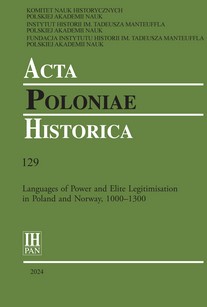FEASTING AND ELITE LEGITIMISATION IN POLAND AND NORWAY: PROPAGANDA, POLITICAL ECONOMY, AND RECOGNITION IN A COMPARATIVE PERSPECTIVE, 1000–1300
FEASTING AND ELITE LEGITIMISATION IN POLAND AND NORWAY: PROPAGANDA, POLITICAL ECONOMY, AND RECOGNITION IN A COMPARATIVE PERSPECTIVE, 1000–1300
Author(s): Wojtek Jezierski, Paweł ŻmudzkiSubject(s): Comparative history, Economic history, Political history, Political economy, 6th to 12th Centuries, 13th to 14th Centuries
Published by: Instytut Historii im. Tadeusza Manteuffla Polskiej Akademii Nauk
Keywords: Ideology; political economy; legitimation; elites; Poland; Norway; feasts;
Summary/Abstract: Abstract This article explores the ways in which the political legitimacy of the elites was produced and demonstrated through feasting as it was practised in two peripheral high-medieval polities, Poland and Norway. By paying attention to the ways the political and moral economy of feasts and their use as a means of propaganda and political recognition were presented in contemporary sources, this article, through two case studies of peripheral languages of power and legitimisation, traces the similarities and differences in elite feasting in these disconnected contexts. Three aspects of political feasting are studied in comparison. First, the question of the supernatural charisma of rulers and ruling dynasties demonstrated through their – mythically and historically framed – ability to provide economic prosperity for their people and followers is examined. Second, we discuss how the rulers’ social power, entitlement, and ability enabled them to extract material resources from the rest of the elites and their subjects, how resources were then redistributed and what symbolic capital these endowed upon the elites. The third section focuses on high-status feasts at which foreign elites from European centres were entertained to secure international recognition of the peripheral elites and gain institutional advantages such as coronations, archepiscopal titles, etc.
Journal: Acta Poloniae Historica
- Issue Year: 2024
- Issue No: 129
- Page Range: 103-142
- Page Count: 40
- Language: English

